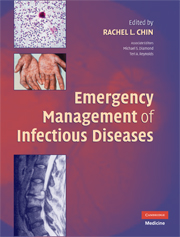Book contents
- Frontmatter
- Contents
- Preface
- Contributors
- Part I Systems
- 1 Infective Endocarditis
- 2 Myocarditis and Pericarditis
- 3 Dental and Odontogenic Infections
- 4 Systemic Diseases Causing Fever and Rash
- 5 Otitis Media
- 6 Otitis Externa
- 7 Sinusitis
- 8 Supraglottitis
- 9 Pharyngitis and Tonsillitis
- 10 Deep Neck Space Infections
- 11 Mumps
- 12 Peritonitis
- 13 Viral Hepatitis
- 14 Infectious Biliary Diseases: Cholecystitis and Cholangitis
- 15 Acute Infectious Diarrhea
- 16 Diarrhea in HIV-Infected Patients
- 17 Ulcerative Sexually Transmitted Diseases
- 18 Nonulcerative Sexually Transmitted Diseases
- 19 Vulvovaginitis
- 20 Male Genitourinary Infections
- 21 Adult Septic Arthritis
- 22 Hand Infections: Fight Bite, Purulent Tenosynovitis, Felon, and Paronychia
- 23 Osteomyelitis
- 24 Open Fractures
- 25 Spinal Infections
- 26 Prosthetic Joint Infections
- 27 Diabetic Foot Infections
- 28 Plantar Puncture Wounds
- 29 Periocular Infections
- 30 Conjunctival and Corneal Infections
- 31 Uvea, Vitreous, and Retina Infections
- 32 Community-Acquired Pneumonia
- 33 Tuberculosis
- 34 Influenza
- 35 HIV-Associated Respiratory Infections
- 36 Arthritis in the Acute Care Setting
- 37 Lower Urinary Tract Infection in Adults
- 38 Pyelonephritis in Adults
- 39 Fever and Headache: Meningitis and Encephalitis
- 40 Fever and Focal Cerebral Dysfunction
- 41 Fever and Acute Weakness Localizing to the Spinal Cord
- 42 Altered Mental Status in HIV-Infected Patients
- 43 Bacterial Skin and Soft-Tissue Infections
- Part II Pediatrics
- Part III Special Populations
- Part IV Current Topics
- Part V Overview of Antibiotics
- Part VI Microbiology/Laboratory Tests
- Part VII Infection Control Precautions
- Index
- References
38 - Pyelonephritis in Adults
from Part I - Systems
Published online by Cambridge University Press: 15 December 2009
- Frontmatter
- Contents
- Preface
- Contributors
- Part I Systems
- 1 Infective Endocarditis
- 2 Myocarditis and Pericarditis
- 3 Dental and Odontogenic Infections
- 4 Systemic Diseases Causing Fever and Rash
- 5 Otitis Media
- 6 Otitis Externa
- 7 Sinusitis
- 8 Supraglottitis
- 9 Pharyngitis and Tonsillitis
- 10 Deep Neck Space Infections
- 11 Mumps
- 12 Peritonitis
- 13 Viral Hepatitis
- 14 Infectious Biliary Diseases: Cholecystitis and Cholangitis
- 15 Acute Infectious Diarrhea
- 16 Diarrhea in HIV-Infected Patients
- 17 Ulcerative Sexually Transmitted Diseases
- 18 Nonulcerative Sexually Transmitted Diseases
- 19 Vulvovaginitis
- 20 Male Genitourinary Infections
- 21 Adult Septic Arthritis
- 22 Hand Infections: Fight Bite, Purulent Tenosynovitis, Felon, and Paronychia
- 23 Osteomyelitis
- 24 Open Fractures
- 25 Spinal Infections
- 26 Prosthetic Joint Infections
- 27 Diabetic Foot Infections
- 28 Plantar Puncture Wounds
- 29 Periocular Infections
- 30 Conjunctival and Corneal Infections
- 31 Uvea, Vitreous, and Retina Infections
- 32 Community-Acquired Pneumonia
- 33 Tuberculosis
- 34 Influenza
- 35 HIV-Associated Respiratory Infections
- 36 Arthritis in the Acute Care Setting
- 37 Lower Urinary Tract Infection in Adults
- 38 Pyelonephritis in Adults
- 39 Fever and Headache: Meningitis and Encephalitis
- 40 Fever and Focal Cerebral Dysfunction
- 41 Fever and Acute Weakness Localizing to the Spinal Cord
- 42 Altered Mental Status in HIV-Infected Patients
- 43 Bacterial Skin and Soft-Tissue Infections
- Part II Pediatrics
- Part III Special Populations
- Part IV Current Topics
- Part V Overview of Antibiotics
- Part VI Microbiology/Laboratory Tests
- Part VII Infection Control Precautions
- Index
- References
Summary
INTRODUCTION
Acute pyelonephritis, an upper urinary tract infection, describes a clinical syndrome of bacteriuria associated with fever, chills, flank pain or tenderness, and lower urinary tract symptoms (e.g., frequency, urgency, dysuria). Uncomplicated infections are those in healthy, nonpregnant females aged 18–40 years, without underlying comorbidities, structural defects in urinary anatomy, or renal dysfunction. Criteria for complicated infection include extremes of age, male gender, immunosuppression (e.g., diabetes, malignancy), pregnancy, presence of a urinary catheter, an anatomic or functional abnormality, obstruction, or history of instrumentation, or the presence of an unusual or resistant organism.
EPIDEMIOLOGY
There are approximately 250,000 cases of acute pyelonephritis annually in the United States, and it is estimated that 30% of these patients are hospitalized. The prevalence of disease is greater in women than men. Men are at higher risk for pyelonephritis if they are uncircumcised, have an enlarged prostate causing urinary stasis, participate in rectal intercourse, or have undergone recent urologic instrumentation or surgery.
Other populations at risk for acute pyelonephritis include those with urinary catheters, spinal cord injury, neurogenic bladder, or fistulae involving the bladder or ureters, or who have undergone renal transplantation. Pregnant women, especially during the second trimester, are also at higher risk for pyelonephritis because of hormonally induced changes in the urinary system. Potential complications of acute pyelonephritis during pregnancy include septicemia, premature labor and low-birth-weight infants.
- Type
- Chapter
- Information
- Emergency Management of Infectious Diseases , pp. 215 - 220Publisher: Cambridge University PressPrint publication year: 2008



